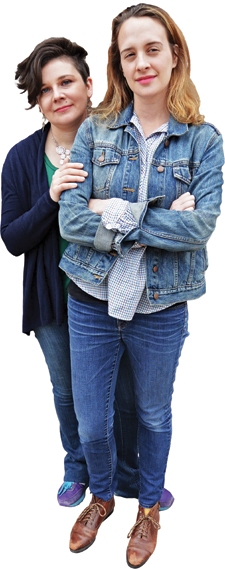Emily Books was launched in 2011 as a way for founders Emily Gould and Ruth Curry to share, as they write in their mission statement, “weird books by women.” Each month they choose a previously published work of prose or poetry that is hard to find or out of print, digitize it, and send it to their subscribers as an e-book—their list has included the work of Elena Ferrante, Eileen Myles, and Ellen Willis, among other pioneering women writers. Now the two are partnering with Coffee House Press to expand Emily Books into print, launching an imprint that will publish two new works of transgressive and genre-bending prose by women, trans, and queer writers each year (the editors are open to queries year-round). With the first Emily Books print title out this month—Jade Sharma’s debut novel, Problems—Gould and Curry discuss the evolution of their project.
 How did you meet and decide to start Emily books?
How did you meet and decide to start Emily books?
Ruth Curry: We met about eleven years ago. We worked at the same big corporate publishing company. It’s funny, we actually applied to the same job—Emily and I both got to the last round of interviews. It was between her and me, but she got it. And I was so disappointed. But the publishing house kept my résumé on file, and six months later I got a call for a different opening. So then I got that job, and I wanted to know, “Who is this girl who got my job?” I was just so curious. We started becoming friends.
Emily Gould: Getting our start in big, corporate publishing and having experience working on cookbooks and celebrity memoirs, I think, perversely, has helped us a ton even though what we’re doing now is the polar opposite end of the spectrum. We still understand what it’s like to be in those meetings. We still understand what selling big books is like, and it made us believe that we would be able to crack the eternal problem of book marketing: uniting books with their audience.
Curry: So we became work friends and then we became real friends, and time passed, like that chapter of Mrs. Dalloway. Five years ago, we had both moved onto different jobs in publishing—Emily worked with Gawker, and had already written two books and was working on her third. I had left New York and come back, worked at a literary agency, and did one year of an MFA program before dropping out. We were both underemployed and confused and just about to turn thirty…
Gould: …but also really wanting to get back into publishing but not really seeing how, not really seeing the voices of authors who we cared about represented. We’re huge readers, and our friendship has always been based a lot on trading books back and forth, and we thought, “How do we replicate this? How do we recommend books to people?”
Curry: At this point, everyone was saying, “E-books are the future!” since there had just been a huge spike in sales. It has sort of recalibrated at this point, but at the time what we wanted to do was [digitally] replicate the experience of going into a favorite bookstore. My favorite [Brooklyn] bookstore is Greenlight—Emily’s is Word—and everyone at the store knows me and will recommend books, and I recognize people browsing there. We wanted to replicate that experience of having a local indie bookstore that you love, but online.
Gould: But we quickly realized that all the books we loved so much and felt were underrepresented or cult classics were books that had been published badly or had fallen out of print…
Curry: …or had just been published by a really small publisher that went out of business…
Gould: …or whose list got taken over by someone else. What we realized, eventually—after we’d already been in business for a couple of months and had started picking the books and sending them out to our subscribers—was that all the books we wanted to select were by women. And if there were underappreciated geniuses that were male…we still haven’t actually encountered any.
Curry: At one point, Emily said, “We might have to start using the f word.” And I thought, “What is she talking about?” And she said, “feminist.”
How do you grow your list?
Curry: After we’d been around for six months or so, people started recommending stuff to us. Or people whose books we had selected would recommend other books to feature.
Gould: That’s still a big source of recommendations for us, the authors. Even authors who aren’t Emily Books authors will recommend books that have been really important to them that we’ve never heard of.
Curry: And our readers too. Our readers are super savvy and really cool.
Gould: We’ve gotten a lot of suggestions from our subscribers.
What’s your read-to-recommend ratio?
Curry: In the last year or so we’ve gotten a lot better at figuring out exactly what works for us, so it used to be a lot higher. But I would say four to one.
Gould: I would say higher, like seven to one. We read a lot.
Curry: We read a lot of stuff, yeah. But now we’re pretty well established and have reached the point where we could plan out our next twelve months if we wanted to. We’re still waiting to be surprised by something that’s new and great, but I think we’ve really nailed what we want to do and are not casting about as much as we used to.
Gould: Another thing is that more books like our books are being published, which is a really new thing—it’s just been happening in the past few years.
Curry: Like Jenny Zhang, who just got that book deal with Lena Dunham’s imprint [at Random House]. She’s a great writer—she would have been published at some point anyway—but that it’s happening now, and in such a big way, is relatively new.
Gould: There’s still a lot of work that needs to be done to correct for years of the systematic erasure of women, queer people, and people of color…
Curry: …especially women of color.
Gould: We don’t think that work is anything close to being accomplished. There’s definitely still a place for us, but it does seem like the kind of books that we do are a little bit flavor-of-the-month now, and bigger publishers are sort of starting to listen to that. But we’ll still be here after it has stopped being trendy.








